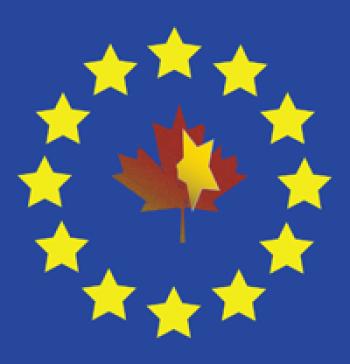The Trade Justice Network and Réseau québécois sur l’intégration continentale (RQIC) co-hosted a media teleconference on parts of the Canada-EU trade deal that have become very controversial in Europe. Speakers included Jeremie Zimmermann of La Quadrature du Net in Paris (on copyright and Internet regulation), Gabriella Zanzanaini of Food & Water Europe (on water services and the European Commission’s privatization agenda), and Peter Fuchs with Berlin-based PowerShift (on investment protection and the proposed investor-state dispute settlement process in CETA.)
The teleconference was well attended by journalists and organizations in Canada, many of them from Quebec where the newly elected Parti Québécois adds a wild-card element to the ongoing CETA negotiations. Gabriella’s presentation on water services struck a chord and was reported in Le Devoir. In her presentation, Gabriella explained that while they are fighting the forced privatization of water services in Portugal and Greece (forced by the Commission as a condition of receiving bailout money), they are very concerned about how Canada is using the CETA negotiations to undermine a broad EU carve-out for water services in its existing trade deals.
As I explained on the call, the main danger for Canada and the EU, if CETA goes ahead on Canada’s terms, is not that multinational companies will be able to force municipalities to privatize their water services. It’s that cities will not be able to reverse those privatizations when things go wrong. This is not disputed by Canada’s CETA negotiators. The deal as planned would lock in private water services, encouraging the expansion of private water across Canada.
Radio-Canada also reported on the teleconference, leading with the possibility, raised by Jeremie Zimmermann, of the criminalization of certain online activities perceived to violate intellectual property rights, and the replication of ACTA-like enforcement measures in CETA. This is bar none the most visibly (online) irritating part of the CETA negotiations. Type #CETA into Twitter today and see what I mean. The EU Parliament voted against the Anti-Counterfeiting Trade Agreement in the summer because it was negotiated in secret and contained unacceptable criminal enforcement measures for copyright and other intellectual property violations.
Canada’s CETA negotiators say the Canadian government will not need to introduce new legislation to bring our rules in line with the CETA copyright provisions, but Michael Geist of the University of Ottawa questions the assertion in his blog this week.
“Notwithstanding those reassurances, Canadian officials acknowledged the border measures issues were still unresolved,” writes Geist. “Moreover, days later a European briefing offered a somewhat different take on the copyright provisions. La Quadrature du Net, a leading European NGO, reports that the European Commission confirmed that the controversial criminal ACTA provisions were still included in the CETA draft.”
The Radio-Canada article also references Peter’s presentation on the limits that investment protections put on democratic governance, and particularly energy policy and resource conservation measures. The issue that normally flies way below the radar has exploded into the Canadian consciousness this month with the prospect of handing Chinese energy firms a de facto veto on Canadian energy and conservation policy through a bilateral investment treaty (FIPPA) announced by Harper on September 26.
Peter used the case of a Swedish energy firm going to investor-state arbitration to challenge Germany’s decision to phase-out nuclear power as a good example of where the risks lie for Europe in including the same investor rights in CETA. He explained that with all the Canadian investment in European energy, and European investment in the tar sands, the safest thing we can do is take investor-state arbitration out of CETA.
Canada-EU trade negotiations continue this week in Brussels. We’ll have more updates along the way. The two networks (TJN and RQIC) are encouraged by the new attention European activists are paying to CETA, and the new connections we are making in our struggle to stop this bad deal from going ahead.



